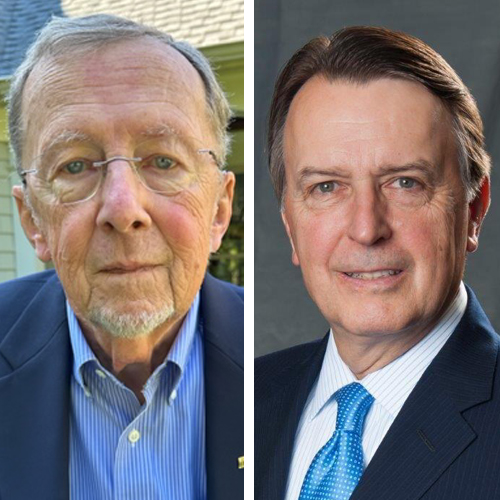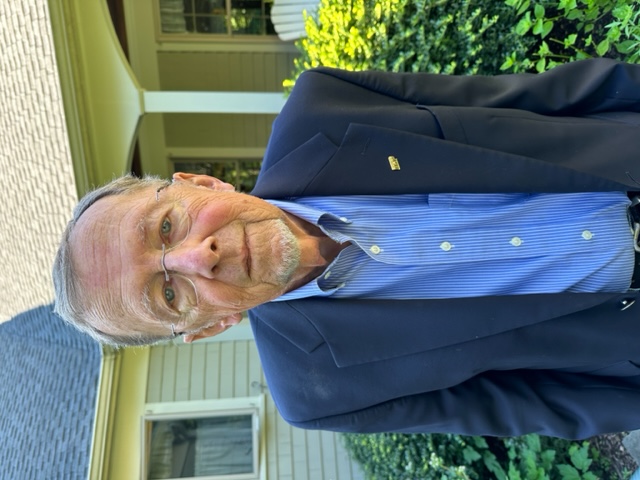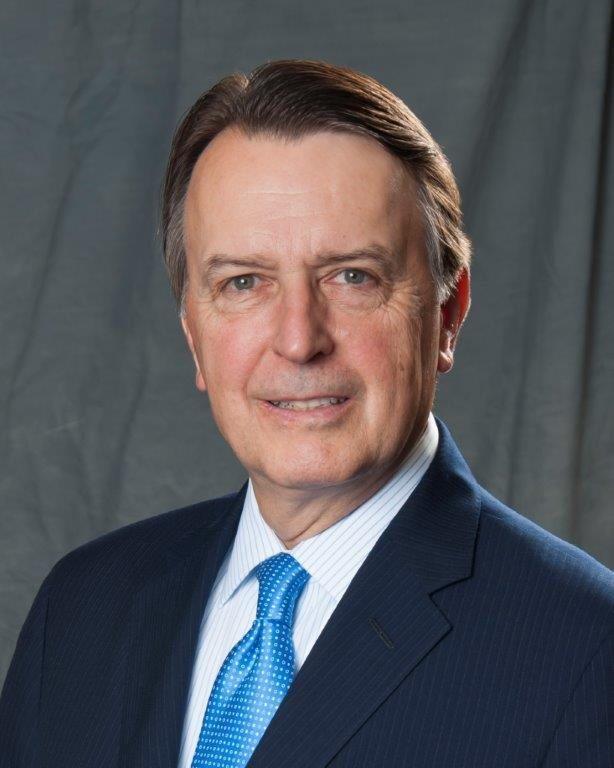
2023 Citation of Merit Recipients
John Grandin ’63 and Ralph Wellington ’68 are the 2023 recipients of the Citation of Merit award.
Citation of Merit Award and Nominations
The Emeriti Club Citation of Merit honors those who have demonstrated affection for the College by their loyalty and involvement in the activities and programs of Kalamazoo College. Criteria for the selection of citation recipients are as follows:
- Length of time attended Kalamazoo College. All alumni of Kalamazoo College who matriculated in classes 50 or more years ago and attended six or more terms are eligible for nomination
- Demonstration of affection for the College by loyalty, service, financial support and involvement in the activities and programs of Kalamazoo College
- Outstanding professional experience
- Civic, church, school and/or community service
Members of the Emeriti Club are encouraged to nominate fellow members to receive a Citation of Merit Award. Please use the online nomination form, or print and send a form to the Office of Alumni Engagement anytime throughout the year. Please provide as much information as possible about the nominee. The Emeriti Club Leadership Council meets in the spring to consider the nominees and select the citation recipients. Nominees not selected are kept for future consideration.
About John Grandin ’63 and Ralph Wellington ’68
John Grandin ’63
Read about John Grandin – The Power of K
“There are people in Germany who speak German.”
With that statement John Grandin expresses the power of Kalamazoo College, for there is a difference between knowing something cognitively and experiencing it dramatically … a difference that can launch a life journey.
“As the twenty-year-old son of a Baptist minister from a small, homogenous community in central Massachusetts,” Grandin says, “being sent to Germany in the summer of 1960 ushered me into a very different world. First, I learned that there were people who actually spoke German, and that I too could learn to communicate in that language and have fun doing it. I also learned there were many people who had been shaped by very different experiences and who had insights into history, society, and life quite different from my own.”
That 1960 summer of study in Bonn, Germany, was an experiment that helped birth the K-Plan and remains John’s fondest memory of his undergraduate years. “It changed my life and opened many doors,” says the retired professor of German and international educator.
John’s selection into the experiment (one of 48 K students who studied in Germany, France, and Spain that summer) came as a surprise to him. “My high school experience in Latin was a disaster,” he says, “so the notion of studying a foreign language in college did not appeal.”
His clergyman father (Reverend Hartley T. Grandin, Kalamazoo College Class of 1923) hoped his son might follow him into the ministry and suggested that learning German would be excellent preparation for studying several great philosophers and theologians.
“Surprisingly, beginning German turned out to be my strongest class my freshman year,” says Grandin. “I was happy to enroll in the intermediate course sophomore year.” Even more unexpectedly: “My German teacher, Frau Elizabeth Mayer, asked me after class one day if I wanted to spend the coming summer in Germany, living with a family in Bonn and taking an intensive German course at the university.”
John earned his K degree in philosophy. His favorite K teachers: Professor of Philosophy Lester Start and Gunther Spaltman, a guest faculty member from Germany. John holds Master’s degrees in teaching (Wesleyan University) and German (University of Michigan) and a Ph.D. in German (University of Michigan).
The University of Rhode Island awarded John an honorary doctorate in Engineering in 2019 to celebrate and honor his lifelong, liberal arts commitment to learning across disciplines (he is the author of “Merging Languages and Engineering: Partnering Across the Disciplines, Synthesis Lectures on Global Engineering”).
John is also highly regarded by the country he first visited in the summer of 1960. The Federal Republic of Germany has honored him with the Federal Cross of Honor (2010) and the Federal Cross of Honor First Class (2018).

Ralph Wellington ’68
Read about Ralph Wellington – Why I Chose K
There’s something special about the small world of a midwestern farm town. In fact, one reason Ralph Wellington chose Kalamazoo College was its proximity to his hometown of Three Rivers, Mich.
“K introduced me to the world,” says Ralph. And that’s special, too! The at-one-time would-be physician “ended up majoring in Political Science,” he says, “because of great classes with Professor Don Flesche and an eye-opening spring internship on Capitol Hill with U.S. Congressman J. Edward Hutchinson.” The latter experience turned out to be a key influence in Ralph’s decision to pursue a legal career rather than one in medicine. And what a career it has been.
After graduating from the University of Michigan School of Law, Ralph received a job offer from the renowned firm of Schnader Harrison Segal & Lewis (Philadelphia), where he spent his entire career, twelve years of which as the firm’s chairman. He served as a trial and appellate lawyer for major litigations in multiple jurisdictions in the United States, usually on the defense side. He has argued before the U.S. Supreme Court, founded an aviation practice in his firm that represented the aviation industry in multiple cases around the country, and for several years directed an educational seminar in London, England, on the U.S. jury system. Ralph was one of 10 witnesses who testified before Congress concerning legislation that resulted in the Class Action Reform Act. He was a member of a volunteer pro bono team that worked for five years on an Innocence Project case. This June that case resulted in the release of a man from prison who had served 34 years for a murder he did not commit.
His civic involvements include service on behalf of, among others, the Philadelphia Volunteer Lawyers for the Arts, the Mann Center for the Performing Arts, the Lutheran Settlement House, and the Kalamazoo College Board of Trustees. His legal acumen has been cited and honored by many professional societies, and he has received awards for his pro bono work.
His entire resumé does the liberal arts proud! At K he played on the basketball and baseball teams in each of his undergraduate years. The 1967 basketball team on which he played reigned as MIAA co-champion. The following year Ralph received the College’s Athletic Association Award for combined excellence in scholarship and athletics. Ralph also excels in artistic pursuits. He is a jazz pianist who has played in two bands for the past four decades. He has published several short stories and, four years ago, began work in a new art medium: oil painting.
Nor have sports ever left his life. For 40 years he’s played squash and golf, and these days plays pickleball and padel.

Past Recipients
The name of the honoree is listed alphabetically, followed by class year and the year the award was bestowed.
A
Harold Brainard Allen ’21 (1977) #
Harold Byron Allen ’24 (1975) •
Ray T. Allen ’30 (1990)
Donald T. Anderson ’33 (1984)
Hugh V. Anderson ’43 (2007) #
Helen W. Appeldoorn ’29 (1981)
B
Justin Bacon H’33 (1966)
Marston S. Balch ’23 (1975)
Robert S. Barrows, Sr. ’42 (1993)
Elinore Hoven Basnett ’43 (1997) #
H. Lewis Batts, Jr. ′43 (2001) •
Jean McColl Batts ′43 (2001)
Harold D. Beadle ’25 (1980)
Russell J. Becker ’44 (2007)
Donald R. Belcher ’09, H’44 (1967)
Bruce Benton ’64 (2022) •
Robert T. Binhammer ′51 (2004)
Betty Hoben Brown ’33 (1987)
Earl H. Brown ’23 (1976)
Harold W. Brown ’24 (1975) •
William Buchanan ’14 (1965)
C
I. Carl Candoli ’50 (2006) •
George F. Cartland ’24 (1980)
Coleman Caryl ’14 (1971)
Ruth Scott Chenery ’24 (1975) #
Barbara Goodsell Clark ′47 (2007)
Frances O. Clark ’28 (1983) •
Orval S. Clay ’40 (1992)
Versa V. Cole ’27 (1982)
Joyce Kirk Coleman ’66 (2018) #
Richard Compans ’63 (2021)
Maynard M. Conrad ’36 (1995) #
Laurence A. Cook ’30 (1990)
John N. Cooper ’35 (1988)
Helen Coover ’33 (1984) #
Richard B. Crandell ’32 (1985)
Alma Smith Crawford ’27 (1985) •
William H. Culver ’42 (1994 posthumously)
D
Albert L. Deal ’37 (1988) #
Harold Decker ’67 (2022) •
Rosemary (Luther) DeHoog ′60 (2011)
John M. Dentler ’48 (2014)
Karen (Lake) De Vos ’59 (2010) #
Robert D. Dewey ′47 (2003) #
Lewis L. Dipple ’27 (1979)
Gordon Dolbee ′50 (2005) #
Mildred Doster ’30 (1990) •
Donald B. Doubleday ’26 (1989)
William C. Drier ’40 (1992)
Marion H. Dunsmore ’20 (1972)
E
Frances Eldridge ’14 (1969)
F
George Ferguson ’13 (1973)
Robert F. Finlay ’35 (1988)
Elizabeth Stetson Fleugel ’17 (1971)
James H. Fowler ’56 (2009)
Marlene (Crandell) Francis ’58 (2009) #
Elsie Herbold Froeschner ’35 (1997) •
G
Harry T. Garland ’68 (2021) •
Ilse Gebhard ’62 (2015)
Alfred J. Gemrich ’60 (2018) #
Walter A. Good ’37 (1996) •
William E. Good ’37 (1996) •
Agnes Grenell Goss ’12 (1967)
Louise L. Goss ′48 (2001)
Leslie F. Greene ’35 (1994)
Frederic Groetsema ’31, H’53 (1991)
Martha Guse ’37 (1989)
H
Mildred Gang Hackney ’28 (1988 posthumously)
Charlotte (Hauch) Hall ’66 (2019)
Caroline Richardson Ham ′48 (2005) #
Mildred Tanis Harris ’18 (1979)
Lois Stutzman Harvey ’29 (1993) #
Ruth Demme Hayes ’37 (1996)
Don W. Hayne ’32 (1996)
Robert “Red” Heerens ′38 (1999)
Marilyn Hinkle ′44 (1999) #+
Paul S. Hiyama ′49 (2011)
Winfield J. Hollander ’28 (1982)
Richard C. Howlett ’41 (1995)
Richard Hudson ’18 (1973)
Winthrop S. Hudson ’33 (1983)
J
Anna Monteith Johnson ’15 (1968)
Charles K. Johnson ’32, H’50 (1982)
Pauline Byrd Johnson ’26 (1977)
Warren C. Johnson ’22 (1977)
K
Phillip A. Katzman ’27 (1981)
Leland J. Kerman ’16 (1974)
Roy G. Klepser ’33 (1986)
Ruth Knoll ′58 (2013)
Thomas E. Kreilick ’60 (2016)
Edith Kuitert ’41 (1998)
Louis C. Kuitert ’39 (1997)
Charles J. Kurtz 1894 (1965)
L
Thomas W. Lambert ’63 (2019) #
John P. Lambooy ’37 (1992)
Louis Levin ’29 (1981)
Shirley Payne Low ’26 (1984)
M
Jacqueline Buck Mallinson ’48 (1998) •
Margaret Hootman Marsh ’41 (1995)
Gertrude F. McCulloch ’16 (1970)
Jeriene Ward McKee ’35 (1991)
Marion (Poller) Meyer ′49 (2013)
Richard Meyerson ’49 (2006)
John D. Montgomery ′41 (2001) •
Jane Merson Moore ′40 (2002)
Lansford J. Moore ′40 (2002)
Andrew F. Murch ’29 (1987)
N
Carl Norcross ’23 (1974)
Peter H. Norg ’27 (1983)
Louise Northam ′36 (2005) #
0
Kiyonao Okami ’40 (1998)
P
Jane (Hunter) Parker ’48 (2010)
Mary Frances Miller Patton ’36 (1991)
Clifton W. Perry ’22 (1979)
Fern Ball Persons ’31 (1987)
Oscar J. Peterson ’15 (1969)
Eleanor (Humphrey) Pinkham ′48 (2008) +
Ernest E. Piper ’14 (1969)
Robert Poel ’62 (2015)
John G. Polzin ’47 (2006) #
Jack Price ’54 (2009)
R
Ruth Goss Eldridge Ralston ’17 (1976)
Charles A. Randall ’36 (1991)
Mabel Benson Ratcliffe ’13 (1973)
Murray Rice ’19 (1972)
Eleanor Currey Rich ’19 (1974)
Bess Freeman Rickman ’16 (1980)
Gladys Martin Rowland ’14 (1970)
S
Curtis W. Sabrosky ’31 (1985)
Carl E. Schweitzer ’36 (1993)
Chuck Seifert ′55 (2013)
Mildred Welsh Shackleton ’15 (1972)
Luel P. Simmons ′42 (1993) #
Marian Wilson Simmons ’42 (1993) #
B. Thomas Smith ′55 (2010) #
Gordon V. Smith ’28 (1986)
Mary Lou (Schofield) Smith ’55 (2010) #
Russell T. Snip ’40 (1992)
Marian (Hall) Starbuck ′45 (2008) #
Katharine L. Swift ′31 (1998)
T
Edward “Ned” Thomas ’29 (1997)
Betty Shaler Thompson ′41 (1999)
Louis T.E. Thompson ’14 (1967)
Royena Hornbeck Tice ’26 (1978) #
Dee Tourtellotte ’25 (1978)
V
Edward A. VanDyke ’42 (1994)
Merrilyn (Cigard) Vaughn-Hoffman ’58 (2014)
Charles J. Venema ’33 (1994) #
William Venema ’59 (2017)
W
Lillian Kroegen Walcott ’11 (1971)
William H. Weber ′39 (2003)
Charlotte Rickman Wiedoeft ’32 (1989)
Monroe J. Wilcox ′21 (1972)
George W. Williams ′41 (2002)
G. Daniel Wood ′40 (2002)
Helen Cary Everett Wood ′22 (1986)
William P. Woodard ′18 (1968)
Diane Dugas Worden ’59 (2016)
Donald T. Worth ′40 (2004)
Y
Eugene G. Yehle ′41 (2003)
Mildred Hoff Yehle ′43 (2003)
Z
Wendell C. Zeluff ′36 (1993)
• Received Distinguished Achievement Award
# Received Distinguished Service Award
+ Received Weimer K. Hicks Award

